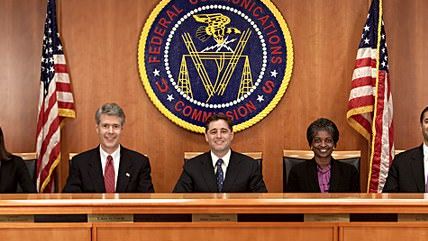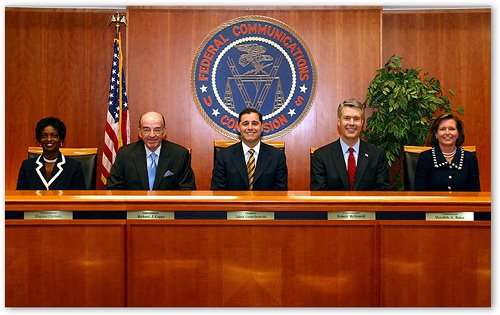FCC Says the Mobile Market Is Too Dynamic To Conclude That It's Competitive


Larry Downes, at CNet, has an excellent piece taking the Federal Communications Commission to task for refusing to concede that the the market for mobile communications is competitive. The FCC was charged by Congress with determining exactly that and, over the course of a 400-page report, the federal body hems, haws and asserts that the mobile industry is too dynamic to determine one way or the other, and that there's no clear definition of "competitive" anyway, so it can't tell. This, Downes credibly suggests, is a cynical effort by bureaucrats to head off conclusions that their services aren't needed.
There's a lot of verbiage in the 16th Mobile Competition Report, released March 21, but the gist is nicely captured here:
Given the Report's expansive view of mobile wireless services and its examination of competition across the entire mobile wireless ecosystem, we find that the mobile wireless ecosystem is sufficiently complex and multi-faceted that it would not be meaningful to try to make a single, all-inclusive finding regarding effective competition that adequately encompasses the level of competition in the various interrelated segments, types of services, and vast geographic areas of the mobile wireless industry.
We note as well that there is no definition of "effective competition" widely accepted by economists or competition policy authorities such as the U.S. Department of Justice (DOJ). …
We take an approach consistent with the Commission's first seven Annual CMRS Competition Reports, which did not reach an overall conclusion regarding whether or not the CMRS marketplace was effectively competitive, but provided an analysis and description of the CMRS industry's competitive metrics and trends. This Report, like the previous two Reports, adopts an approach similar to the earlier reports, but undertakes an expanded and more detailed competitive analysis of the entire mobile wireless ecosystem. We provide an analysis of whether or not there is effective mobile wireless competition, but refrain from providing any single conclusion because such an assessment would be incomplete and possibly misleading in light of the variations and complexities we observe.
As Bill the Cat might say, "Thppppt!"
But Downes adds a little more detail to his critique, writing:
Genachowski's tenure was marked by dubious interventions, large and small, in the markets over which the FCC has authority -- including broadcasting, cable, telephone, and mobile. While the chairman promised that the commission under his leadership would practice fact-based decision-making , the FCC instead frequently engaged in results-oriented politics aimed at supporting White House efforts to appear tougher on corporations.
Its refusal to find "effective competition" in the mobile ecosystem -- along with related non-conclusions on the pace of deployment of all broadband services -- was cynically designed to leave the chairman a free hand to activate emergency powers. These powers include everything from net neutrality to extracting conditions on a variety of spectrum transactions and mergers.
Downes goes on to deride the report as a "wasted opportunity" to recognize the dynamic, wide-ranging nature of a fast-evolving industry, but the report's fudged conclusions are more than that. They're yet more evidence that it's a really, really bad idea to allow government officials to determine whether or not their continued accumulation and exercise of power is necessary. So far as they're concerned, it always is.
Editor's Note: As of February 29, 2024, commenting privileges on reason.com posts are limited to Reason Plus subscribers. Past commenters are grandfathered in for a temporary period. Subscribe here to preserve your ability to comment. Your Reason Plus subscription also gives you an ad-free version of reason.com, along with full access to the digital edition and archives of Reason magazine. We request that comments be civil and on-topic. We do not moderate or assume any responsibility for comments, which are owned by the readers who post them. Comments do not represent the views of reason.com or Reason Foundation. We reserve the right to delete any comment and ban commenters for any reason at any time. Comments may only be edited within 5 minutes of posting. Report abuses.
Please to post comments


"We note as well that there is no definition of "effective competition" widely accepted by economists or competition policy authorities such as the U.S. Department of Justice (DOJ). ..."
Gee, let's make up a term and then find no one has defined it!
I think what we need here is MORE regulation to enforce "effective competition". How will companies know how to effectively compete with each other if they aren't told how in a detailed, publicly funded, step by step guide to proper competition.
I mean, without the regulations, they might actually lower prices and come out with better technology. That would be unforgivable.
Wait, useless statist parasites come to a conclusion that justifies their useless existence? I can't believe it. What next, you'll be telling me that we have to have a government?
They went with the 'Words have no meaning anyways' argument?
The mobile market: We won't know what's in it until we regulate it.
And we certainly hope it doesn't turn out that that other mess where we're learning what's in it.
Shhhh! Don't give it ideas.
Is there a Competition Committee that doles out competition licenses and sets competition quotas? If not, why not? How can we have a free market without enlightened, bureaucratic leadership?
I bet you we have what you just joked about within 10 years.
You've used one of your twenty free speech credits right there. Hope you aren't running low--lots of year left to express yourself!
It's cool, I sold him all my credits for a sandwich.
See? The free market at work.
Telling bureaucrats that their job is to produce justifications for their continued employment is the fastest way to replicate 1000 monkeys randomly typing in an effort to duplicate Shakespeare. And if you can't see Hamlet in what they've produced, obviously, they need to work harder, and increase staffing levels.
After reading through today's HyR offerings, the common thread is that we are being lied to by our government betters. Any ideas how to make this stop?
Hemp rope?
A terrified nation cries out for order. Where is our Diana Moon Glampers?
Sounds like their big moan is that the market is too competitive to determine whether or not it's competitive.
If there are 10,000 providers, each miniscule and incapable of innovating, securing market share by lowering costs, there is competition. If there is one provider that is massive and incapable of innovating, securing market share by preventing the emergence of other firms, there is no competition. If there are several firms, each fairly large and capable of innovating, securing market share by specializing services and controlling costs, then WHO KNOWS IF IT'S COMPETITIVE AT ALL.
It's like none of them have read Schumpeter.
Any ideas how to make this stop?
Cut out their tongues.
So, they set out to determine whether the market displayed features which they refused to define and that used that lack of definition to say that they must continue monitoring the market since it can't be shown to display the undefined features, thus proving nothing, keeping open the possibility of future regulation, and securing a continued existence of evaluating body?
That sounds about par for the course.
What next, you'll be telling me that we have to have a government?
It's that, or roving bands of marauders. Roving bands of marauders with no badges, that is.
...asserts that the mobile industry is too dynamic to determine one way or the other
The only solution is to make the industry less dynamic so that the FCC can do its job. Send in the regulations.
This, Downes credibly suggests, is a cynical effort by bureaucrats to head off conclusions that their services aren't needed.
EUREKA! We have finally discovered transparency within the Obama Administration.